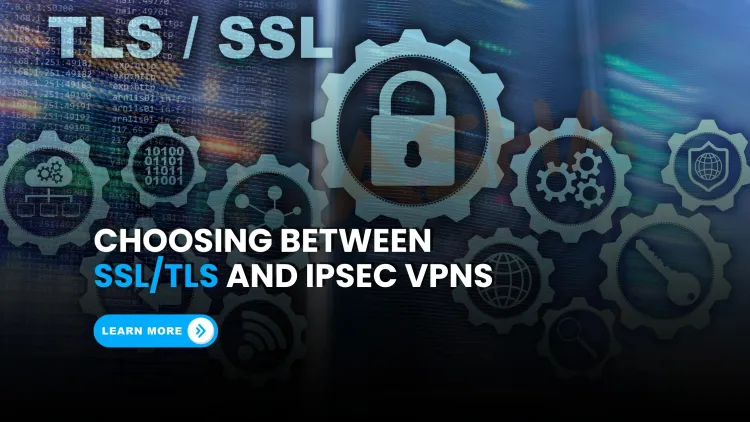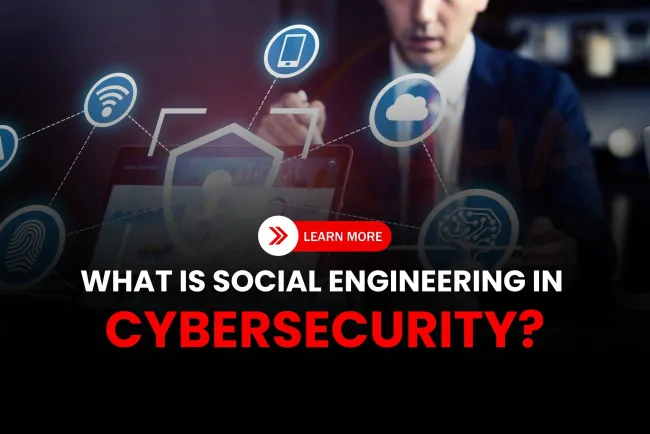What is the difference between SSL/TLS VPN and IPsec VPN, and which one should I use?
SSL/TLS VPN and IPsec VPN are both secure methods for remote access, but they serve different needs. SSL/TLS VPN works at higher layers (Transport and Application), making it ideal for browser-based, remote access to specific applications. It's commonly used in organizations for employees working remotely without requiring complex setup. On the other hand, IPsec VPN works at the Network Layer, offering full-network access and is better suited for enterprise site-to-site connections and deeper integration. The best choice depends on whether you need easy, app-level access or full secure communication between networks.

Table of Contents
- What is an SSL/TLS VPN?
- What is an IPsec VPN?
- Comparison Table: SSL/TLS VPN vs. IPsec VPN
- Which VPN Should You Use?
- Conclusion
- Frequently Asked Questions (FAQs)
When we talk about secure internet communication, especially for remote work or protected data exchange, VPNs (Virtual Private Networks) are essential tools. But not all VPNs are the same. Two of the most widely used types are SSL/TLS VPN and IPsec VPN. Both provide encrypted tunnels, but they work differently and are designed for different use cases.
In this blog, we’ll explain both SSL/TLS VPN and IPsec VPN in simple terms, compare them, and help you understand which is better for your needs.
What is an SSL/TLS VPN?
An SSL/TLS VPN (Secure Sockets Layer / Transport Layer Security VPN) is a type of VPN that uses standard web encryption (like HTTPS) to provide access to specific applications.
Key Features:
-
Operates at Layers 4 & 7 (Transport & Application Layers): This means it handles secure communication at the app and data transfer level.
-
Browser-Based Access: Users can connect using a web browser—no extra VPN software is required.
-
App-Specific Access: You can access only selected services like webmail, CRM, or internal company portals.
-
Simple Setup for End-Users: Great for non-technical users working remotely.
-
Used in BYOD (Bring Your Own Device) Scenarios: Especially helpful when employees use personal devices.
Real-World Example:
A sales team accesses their company’s Salesforce CRM from home. Instead of giving them full access to the corporate network, they connect to the CRM over an SSL VPN using their browser, keeping things secure and simple.
What is an IPsec VPN?
IPsec VPN (Internet Protocol Security VPN) is a more traditional and advanced form of VPN. It secures all traffic at the network level between two endpoints—like a user’s device and the company network.
Key Features:
-
Operates at Layer 3 (Network Layer): It encrypts and authenticates all IP packets.
-
Full Network Access: Once connected, the user can access the entire internal network as if they were on-site.
-
Ideal for Site-to-Site Connections: Often used to connect branch offices with headquarters securely.
-
Stronger & Broader Control: Offers deep security policies, routing, and traffic filtering.
-
Requires VPN Client Software: Unlike SSL VPN, users typically need to install a VPN client.
Real-World Example:
A bank with offices in multiple cities uses IPsec VPN to connect its branches to the central data center. Employees can access core banking apps, databases, and internal tools securely, just like they would inside the main office.
Comparison Table: SSL/TLS VPN vs. IPsec VPN
| Feature | SSL/TLS VPN | IPsec VPN |
|---|---|---|
| OSI Layer | Layer 4 (Transport) & Layer 7 (Application) | Layer 3 (Network Layer) |
| Type of Access | Application-specific | Full network access |
| Software Requirement | No – browser-based | Yes – requires client software |
| Use Case | Remote access to apps | Site-to-site, remote full network access |
| Device Compatibility | Easy for personal devices | Managed company devices |
| Setup Complexity | Easier for end-users | Requires more setup and configuration |
| Common Industries | Education, remote helpdesk, small businesses | Finance, government, large enterprises |
| Security Level | Strong (HTTPS-based encryption) | Very strong (IPsec protocol stack) |
| Performance Impact | Lower due to limited access | Higher, depends on entire network routing |
| Firewall/NAT Traversal | Better NAT traversal | May require NAT-T or special config |
Which VPN Should You Use?
The answer depends on your needs:
Choose SSL/TLS VPN if:
-
You want quick and secure access to web-based applications.
-
Users are connecting from personal devices (like a home laptop).
-
You don’t want to install VPN software for each user.
-
You’re a small business, school, or using cloud-based tools.
Choose IPsec VPN if:
-
You need full access to a private network.
-
You want to connect two or more offices securely.
-
You work in industries with strict security rules (finance, healthcare).
-
You can manage software installation and configuration.
Conclusion
Both SSL/TLS VPN and IPsec VPN offer strong encryption and security, but they serve different needs. SSL/TLS VPNs are lightweight, easy to deploy, and perfect for specific application access. IPsec VPNs are powerful and ideal for full-scale secure connectivity between networks or users.
Before you choose, think about your environment—do you need to protect a few apps or your whole network? Do you want easy browser access or a robust VPN tunnel for all data?
Understanding the strengths of each can help you make a smart, secure decision.
FAQs
What is an SSL/TLS VPN?
An SSL/TLS VPN uses Secure Sockets Layer or Transport Layer Security to allow secure remote access to specific web-based applications via a browser.
What is an IPsec VPN?
An IPsec VPN uses Internet Protocol Security to create encrypted connections at the Network Layer, ideal for site-to-site or full remote network access.
Which VPN is better for remote workers?
SSL/TLS VPN is better for remote workers who need browser-based access to applications without installing extra software.
Is IPsec VPN more secure than SSL VPN?
Both are secure, but IPsec provides deeper network-level protection. The best depends on your needs.
Can SSL VPN be used on mobile?
Yes, SSL VPNs work well on mobile browsers or apps for accessing web-based services.
Does IPsec VPN require special software?
Yes, IPsec VPN typically needs client software installed on the user’s device or configuration at the router level.
Can I use SSL VPN for file sharing?
It depends. SSL VPN is best for accessing apps but may have limitations for file transfer compared to IPsec.
Is SSL VPN faster than IPsec VPN?
Not necessarily. SSL VPN is easier to use but speed depends on configuration, bandwidth, and encryption load.
Is IPsec VPN good for gaming or streaming?
Not really. IPsec adds more encryption overhead, which may increase latency. It’s not optimized for high-bandwidth tasks.
How does SSL VPN work?
SSL VPN creates a secure session between the browser and the VPN gateway using SSL/TLS encryption.
How does IPsec VPN work?
IPsec VPN creates an encrypted tunnel between two IP addresses, securing all traffic that passes through it.
Which VPN is easier to set up?
SSL VPN is generally easier as it requires only a browser and user credentials.
Can I use both SSL and IPsec VPN together?
Yes, some systems allow both types for different users or access needs.
Is SSL VPN good for accessing intranet sites?
Yes, especially if they are web-based applications.
What kind of companies use IPsec VPN?
Large enterprises, financial institutions, and government agencies often use IPsec for secure internal communication.
What kind of companies use SSL VPN?
Remote teams, SMBs, and organizations needing quick app access commonly use SSL VPNs.
Does SSL VPN support two-factor authentication?
Yes, most SSL VPNs support 2FA for added security.
Can IPsec VPN connect multiple office locations?
Yes, that’s one of its best use cases—secure site-to-site connectivity.
Which VPN is more scalable?
IPsec VPN is more scalable for large, complex network environments.
What encryption does SSL VPN use?
It uses SSL/TLS protocols, often with AES-256 encryption.
What encryption does IPsec VPN use?
IPsec can use AES, 3DES, and other strong algorithms, depending on configuration.
Are both VPN types compliant with regulations like GDPR?
Yes, if properly configured to protect personal data and secure access.
Can hackers break into an SSL VPN?
If outdated or misconfigured, yes. Regular updates and strong authentication reduce risks.
Is IPsec VPN harder to configure?
Yes, it usually requires network-level changes and is more complex to deploy.
Which is more cost-effective?
SSL VPN may be cheaper due to easier setup and less hardware dependency.
Can I use SSL VPN on public Wi-Fi?
Yes, it's commonly used for secure browsing over public networks.
Is there any risk in using IPsec VPN?
Only if misconfigured—proper firewall rules and updates are critical.
Which VPN works with cloud services?
Both can, but SSL VPNs are often used for quick cloud app access.
Are both VPNs suitable for remote learning?
Yes, but SSL VPNs are more convenient for students accessing LMS platforms.
Do these VPNs log data?
That depends on the provider or company configuration. Good practice is minimal or no logging.














![Top 10 Ethical Hackers in the World [2025]](https://www.webasha.com/blog/uploads/images/202408/image_100x75_66c2f983c207b.webp)








